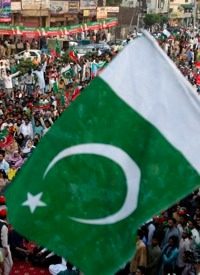
Could bin Laden have taken up residence in the large, custom-built, high-security, walled compound in Abbottabad — virtually next door to Pakistan's major military academy — without Pakistan's knowledge and permission? "Almost impossible," said Sen. Carl Levin (D-Mich.). "Impossible," declared Fox News' Greta Van Susteren. "Inconceivable," stated Obama White House counter-terrorism adviser John Brennan.
Former Secretary of State Henry Kissinger also employed a similar "inconceivable" comment to describe the proposition that Pakistan could have been ignorant of bin Laden's residence in their midst.
"Highly unlikely," said former Pakistani High Commissioner to Britain Dr. Akbar Ahmed. "Not credible," opined former Deputy Secretary of State Richard Armitage. Sen. Mark Udall (D-Colo.) says, "Either the Pakistani government is incompetent or in cahoots."
On this issue there appears to be a rare consensus among Republicans and Democrats, liberals and conservatives, internationalists and constitutionalists, and foreign and domestic pundits and analysts.
Pakistan, which has received billions of dollars in military and civilian aid from the United States and which has been billed as our key ally in the "war on terror," is playing a double game. This has been widely recognized for years but the bin Laden compound in Abbattobad makes the duplicity undeniable. Not only is the property much larger and more extensive and expensive than anything else in the vicinity — with 12-16-ft high walls topped with barbed wire — but locals were aware that many of the people coming and going from the facility were foreigners: Arabs, Tajiks, Uzbeks, Afghanis. According to foreigners who work and travel in Pakistan, it is "not possible" to spend much time in the country — especially if one is a foreigner — without being stopped by the Pakistani Inter-Services Intelligence or ISI. The ISI and its ubiquitous informants are ever on the lookout for spies and saboteurs, especially those of its archenemy India. And in a large military cantonment like Abbattobad foreigners would definitely not be able to build and occupy a compound of the size and nature of bin Laden's without notice of the eyes and ears of the ISI.
In a new PBS "Frontline" documentary entitled, "Fighting for Bin Laden," that aired on May 3, Afghan journalist Najibullah Quraishi is filmed making a dangerous trek into Pakistan's rugged back country to interview "Khan," a veteran of the mujahideen battles against the Soviet invaders of Afghanistan in the 1980s. Khan now leads a band of younger al-Qaeda recruits who operate both in Afghanistan and Pakistan. According to Khan and others interviewed in the program, the government and military of Pakistan not only are well aware of the activities of these groups in their country, but also provide them considerable support.
Many counterterrorism experts believe it is likely that al-Qaeda's No. 2 chief, Dr. Ayman al-Zawahiri, is also in Pakistan (if not in one of the "stans" of the former Soviet Union). Ditto for the Taliban's notorious leader Mullah Omar. In January of this year, the Washington Post reported that Mullah Omar "had a heart attack Jan. 7 and was treated for several days in a Karachi hospital with the help of Pakistan's spy agency." The Post, citing a report by private intelligence company, The Eclipse Group, reported:
"The ISI rushed him to a hospital in Karachi, where he was given heparin [an anticoagulant] and operated on," the Eclipse report said. "After 3-4 days of post-operative care in the hospital, he was released to the ISI and ordered to take absolute bed rest when at home for at least several days."
Congressman Mike Rogers, Chairman of the House Permanent Select Committee on Intelligence, told reporters at a news conference on May 3: "Of the 20 senior leaders in al-Qaeda , at least a dozen of them, we believe to be traveling around Pakistan someplace."
The current exposure of Pakistan's role in assisting al-Qaeda/Taliban provides an opportunity for some of the "experts" to be reminded that this is nothing new; the world's "most wanted" terrorists have been making Pakistan a hideout for many years. The roll-call of terrorists apprehended in Pakistan includes 1993 World Trade Center bomber Ramzi Yousef, 9/11 "mastermind" Khalid Sheikh Mohammed, and Mir Aimal Kasi, who killed two CIA employees and wounded three others in 1993 outside CIA headquarters in Langley, Virginia.
Photo of Pakistani flag: AP Images
Related articles:
Pakistan, Aid Scrutinized After bin Laden Killing
Mumbai Terrorist Was U.S. Agent
Proper Use of the U.S. Military



